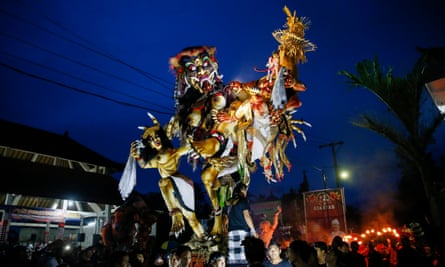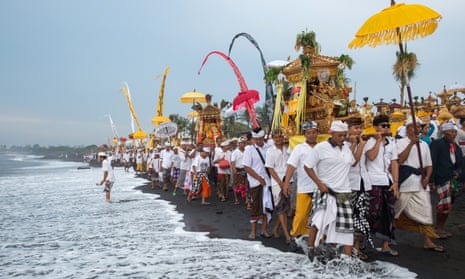New Year’s Day in the West might mean a hangover, a walk and a pub lunch. In Bali, New Year is welcomed in a very different manner – with a day of silence.
The largely Hindu Indonesian island celebrates Nyepi – Silent Day – by completely shutting down for 24 hours. In Ubud, where I’m staying, shops are closing early, ATMs aren’t working and streets are being closed. From 6am tomorrow (28 March) until 6am on Wednesday (the date changes annually following the lunar calendar), no one will leave their home. Religious rules state there should be no traffic, no fire, no work and no pleasure. Streets are eerily empty, shops and restaurants remain closed, the beaches are shut, use of electricity is kept to a minimum, there’s no transport – even the airport closes – and the pecalang community police go on patrol, ensuring compliance and reprimanding anyone who steps outside their premises.

“It’s a day for contemplation, to meditate, to fast, to go inside yourself and reflect on the past year,” says John Sugiharto, a sound healer and owner of Soma cafe in Ubud. “People stay quietly with their families, it’s a very special day.”
Silent Day follows on from raucous New Year’s Eve celebrations, held to chase away malevolent forces. There’s a sense of excitement in the air and in Ubud and the surrounding villages I’ve seen people crafting huge, ugly ogoh-ogoh papier mache effigies, with bulging eyes, fangs and hairy backs representing evil spirits. Each neighbourhood works on their own grotesque creations, which are paraded through the streets, accompanied by traditional gamelan bands and drumming, and burnt to much jubilation. “It symbolises burning your own demons as well chasing bad spirits away,” says Sugiharto.

New Year rituals start three days before Nyepi, with Melasti purification ceremonies on beaches. Every village makes a pilgrimage to the coast, taking sacred temple objects for cleansing and blessings. I joined thousands of villagers dressed in white at Purnama beach about half an hour outside of Ubud as they gathered to make offerings. Festivities continue for two days after Nyepi too, with visits to friends and family to ask for forgiveness and temple ceremonies.
If you’re visiting Bali at the time of Nyepi, hotel restaurants and other facilities are usually open – often with a more basic menu – but you won’t be able to leave your accommodation and no one can check-in. If you’re in a private villa you’ll be expected to keep the noise down and lights off, even if you choose not to observe total silence.
The Balinese have countless festivals and ceremonies year-round, but Nyepi is a particularly interesting time to visit – a new year unlike any other.
Nyepi will fall on 17 March in 2018. While the Balinese follow the Gregorian calendar for business and government purposes, holy days are calculated on the traditional lunar calendar, so the date changes each year

Comments (…)
Sign in or create your Guardian account to join the discussion